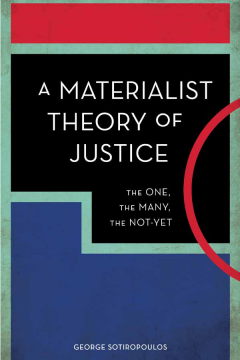
Additional Information
Book Details
Abstract
A Materialist Theory of Justice offers an innovative (re)reading of justice that draws from diverse theoretical currents, tracing in the process an age-old tradition of critical thought. Raising the banner of materialism against idealist conceptions, justice is conceived as a multiple process, which emerges in the dynamic reproduction and interaction of material bodies. Mapping out its presence on non-human fields, justice is then shown to attain in human beings the status of a contentious problem and a productive desire, which is related to the pursuit of a good life and is also determinative of human history.
The theorization enlarges the scope of the notion by incorporating a wide spectrum of phenomena, from animal forms of sociality and activity, to revolution, empire, civil war up to and including the riots that spread out in the world today. In this way, the book also manages to extend beyond the disciplinary boundaries of normative political theory, within which theories of justice are usually logged, and enter a productive discussion with various currents of critical thought.
This book is an antidote to the growing specialisation of political theory. It disrupts the canonical ideal theories of justice by presenting justice as ‘becoming-justice’, a productive desire that simply cannot be satisfied. In this fascinating journey on the multi-dimensionality of justice, we meet new materialists, non-hierarchical struggles such as the Occupy movement, the Indignados, anti-fascist movements, as well as historical examples.
Benoît Dillet, University of Bath, Author of The Political Space of Art
George Sotiropoulos holds a PhD in Political Theory and currently teaches and is a researcher at the International School of Athens.
A witty and thought-provoking book, Sotiropoulous’ A Materialist Theory of Justice is a call-to-arms for those whose thirst for theorising our contemporary social condition has not yet been quenched. Navigating skillfully through the history of philosophy, popular culture and political crises, this book proposes a novel reflection on the future of justice from a politically engaged and engaging perspective.
Charles Devellennes, Lecturer in Political and Social Thought, University of Kent
Table of Contents
| Section Title | Page | Action | Price |
|---|---|---|---|
| Cover | Cover | ||
| A Materialist Theoryof Justice | i | ||
| Series Page | ii | ||
| A Materialist Theory of Justice: The One, the Many, the Not-Yet | iii | ||
| Copyright page | iv | ||
| Contents | v | ||
| Acknowledgements | vii | ||
| Epigraphs | ix | ||
| Introduction | 1 | ||
| At the Edges of Law | 2 | ||
| Other Than Law | 8 | ||
| Overview | 13 | ||
| Chapter 1 | 17 | ||
| Thresholds | 17 | ||
| Ancient Intimations | 20 | ||
| Justice as Material Process and Real Abstraction | 25 | ||
| Wild Justice | 39 | ||
| Chapter 2 | 51 | ||
| Whose Justice? | 51 | ||
| Social Composition and the Problem of Justice | 55 | ||
| Might, Right, Impartiality | 62 | ||
| On the Genealogy of Injustice | 71 | ||
| Chapter 3 | 79 | ||
| Desire Becoming History | 79 | ||
| Becoming-Other, Becoming-Justice | 85 | ||
| Facets of Differentiation I (Ideation) | 100 | ||
| Facets of Differentiation II (Institutionalisation) | 112 | ||
| Chapter 4 | 121 | ||
| Dialectics of Justice | 121 | ||
| Can Dialectics Break Bricks?1 | 122 | ||
| Multiplicity and Universality | 134 | ||
| Order and Freedom | 146 | ||
| Chapter 5 | 161 | ||
| Savages, Patricians, Plebs | 161 | ||
| Justice from Above | 166 | ||
| Justice from Below | 181 | ||
| Justice In-Between, Justice Incomplete | 201 | ||
| Epilogue | 205 | ||
| Of Spectres and Ends | 210 | ||
| Notes | 213 | ||
| INTRODUCTION | 213 | ||
| Chapter 1 | 214 | ||
| Chapter 2 | 215 | ||
| Chapter 3 | 216 | ||
| Chapter 4 | 217 | ||
| Chapter 5 | 219 | ||
| Bibliography | 223 | ||
| Index | 245 | ||
| About the Author | 257 |
